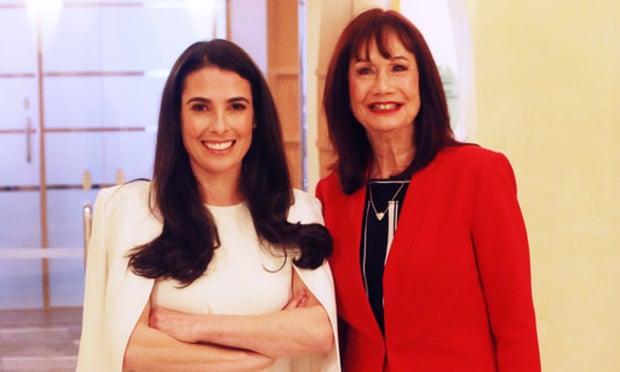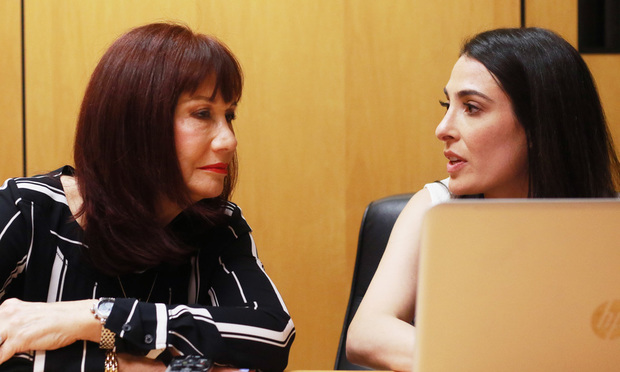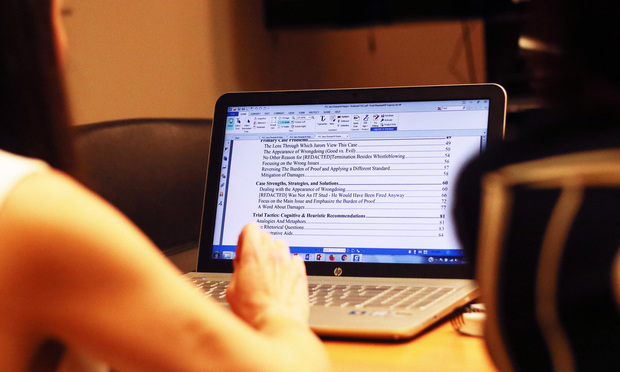Social Science Looks to Demystify the Jury Selection Process
The use of jury consultants who use empirical analysis to find out how a firm's case will play in front of a jury before a trial ever begins has become standard practice -- especially in high-stakes litigation.
February 20, 2019 at 06:09 PM
6 minute read
 Focus Litigation co-founders Geri Satin and Marjorie Sommer (Photo: Dylan Jackson / ALM)
Focus Litigation co-founders Geri Satin and Marjorie Sommer (Photo: Dylan Jackson / ALM)
Jury selection has long been a cryptic process, and every trial attorney has a juror war story and list of voir dire taboos.
Some have called it pure guesswork. Others have described it as a combination of psychology and the dark arts.
But Marjorie Sommer, co-founder of the Florida trial consulting firm Focus Litigation, believes lawyers have too many preconceptions about jury selection. She and her partner Geri Satin say the process need not be a mystery.
“It's a numbers game,” Satin said.
Through qualitative and quantitative analysis (Satin has a doctorate degree in legal psychology from Florida International University) and with the help of a thousand focus groups, mock trials, and real-world verdicts, Sommer and Satin counsel law firms, companies and even government agencies about what type of jury could help their case.
Over the past two decades, the use of trial consultants has become ubiquitous in high-profile cases. In 1983, the American Society of Trial Consultants had less than 20 members. Today, the organization boasts nearly 300. While in its infancy, the industry was viewed with much skepticism. But as the digital era has matured, data analytics has grown more sophisticated, transforming jury consulting into a legal industry that is accepted and even embraced.
Much of their job, Satin said, is to demystify the jury selection process and use their combined 30 years of legal experience to provide actionable recommendations based on their findings.
Since opening in 2013, the duo has worked for law firms, insurance companies and government agencies. Past high-profile clients include law firms such as Boies Schiller Flexner, government agencies, including the U.S. Securities and Exchange Commission, and corporations such as HBO.
“I have absolutely used them with regard to mock trials,” said Jennifer Olmedo-Rodriguez, a litigator and managing partner of Buchanan Ingersoll & Rooney's Miami office. “In a very high-profile case, the benefits would definitely outweigh the costs.”
Jury selection, Olmedo-Rodriguez said, requires a lot of thought and preparation. Often litigators want to rush to tell their story, or a judge may put constraints on voir dire. This is often why attorneys resort to rule-of-thumb preconceptions that may not be accurate.
Consultants, she said, offer a way to look at jury selection that many attorneys simply can't see for themselves.
“The questions you need to ask to uncover these biases aren't second-nature,” she said.
Indeed, Sommer says she's had clients say quite emphatically that they never want a teacher on their jury. Inherent in this statement, she says, is one of the most commonly held misunderstandings about jury selection—that demographics alone can predict a verdict.
But Sommer says when she hears clients making such statements, she asks them if they'd say the same if they were a defendant in a medical malpractice case and the teacher on the jury had just had her son's life saved by a doctor.
“It is life experience, not one's job or neighborhood, that is the most reliable predictor of a jury verdict,” she says. “Life experiences matter.”
 Marjorie Sommer (left) and Geri Satin (Photo: Dylan Jackson/ALM)
Marjorie Sommer (left) and Geri Satin (Photo: Dylan Jackson/ALM)For Satin and Sommer, a typical job begins by traveling to the venue of the particular case they were hired to work on. Then, through a variety of methods, including newspaper ads and cold-calling, Satin and Sommer pull a sample of 24 to 48 people representative of the area's jury pool. The “jurors” must then fill out an exhaustive Q&A sheet meant to find the particular viewpoints of each person.
If the case in question is a labor and employment dispute involving themes of immigration, for example, potential questions might include, “what do you think of President Trump's proposal for the border wall?” or “have you had an experience with an immigrant?”
In fact, sociopolitical issues are big drivers of the business, said Satin. Companies and firms want to know how juries will react to social and political issues like the #MeToo movement and immigration. Another big fault line, especially in cases involving wealthy CEO's and fraud, is the 2008 financial crisis and economic inequality.
“It isn't uncommon, when the witness is a CEO who wants to tell his or her story, to hear mock jurors say 'I had a boss just like him and I don't believe a word he says,'” said Satin. “We then recommend intensive witness preparation to our client.”
As with the demographic trope, Satin and Sommer encounter other myths. For example, many clients involved in a sexual assault case are reluctant to go to trial in light of the #MeToo movement. But Satin has found that in many cases, the movement has had the opposite effect from what might be expected. In one test case where evidence against the defendant was weak, mock jurors accused the plaintiff of disingenuously leveraging the #MeToo movement for her own gain.
“Here we are, all lawyers, and we're trained on the legal issues. We're not really trained on the social science part of it,” said Bruce Katzen, founding partner of Miami-based boutique litigation firm Kluger, Kaplan, Silverman, Katzen & Levine. “It's good to hear how 'real people' react.”
After both sides argue their case, the mock jury deliberations are recorded for analysis and a verdict is rendered. Satin and Sommer then compile a report that can run hundreds of pages, stuffed with recommendations, quantitative analysis that uses a juror's responses to specific questions to correlate a verdict. Advice to clients could include formulating precise questions for voir dire, pointing out what juries perceived as weaknesses in a case, and highlighting the most effective visual aids.
But their job isn't only about jury selection. Satin and Sommer say some of their biggest “wins” come before jury selection even begins. If an insurance company has $500 million in exposure, and the focus groups and mock juries are returning consistent findings against their client, they will advise the client to work on a settlement instead of recommending a trial. If the company settles for $50 million instead of losing big in the courtroom, Satin and Sommer see that as a victory.
“One of the most reliable things we give is a reality check,” Sommer said.
 Photo: Dylan Jackson/ALM
Photo: Dylan Jackson/ALM
This content has been archived. It is available through our partners, LexisNexis® and Bloomberg Law.
To view this content, please continue to their sites.
Not a Lexis Subscriber?
Subscribe Now
Not a Bloomberg Law Subscriber?
Subscribe Now
NOT FOR REPRINT
© 2025 ALM Global, LLC, All Rights Reserved. Request academic re-use from www.copyright.com. All other uses, submit a request to [email protected]. For more information visit Asset & Logo Licensing.
You Might Like
View All
SEC Whistleblower Program: What to Expect Under the Trump Administration
6 minute read
Turning the Shock of a January Marital Split Into Effective Strategies for Your Well-Being
5 minute read
Latest Boutique Combination in Florida Continues Am Law 200 Merger Activity
3 minute read
South Florida Real Estate Lawyers See More Deals Flow, But Concerns Linger
6 minute readTrending Stories
- 1How the Court of Public Opinion Should Factor Into Litigation Strategy
- 2Debevoise Lures Another SDNY Alum, Adding Criminal Division Chief
- 3Cooley Promotes NY Office Leader to Global Litigation Department Chair
- 4What Happens When Lateral Partners’ Guaranteed Compensation Ends?
- 5Tuesday Newspaper
Who Got The Work
J. Brugh Lower of Gibbons has entered an appearance for industrial equipment supplier Devco Corporation in a pending trademark infringement lawsuit. The suit, accusing the defendant of selling knock-off Graco products, was filed Dec. 18 in New Jersey District Court by Rivkin Radler on behalf of Graco Inc. and Graco Minnesota. The case, assigned to U.S. District Judge Zahid N. Quraishi, is 3:24-cv-11294, Graco Inc. et al v. Devco Corporation.
Who Got The Work
Rebecca Maller-Stein and Kent A. Yalowitz of Arnold & Porter Kaye Scholer have entered their appearances for Hanaco Venture Capital and its executives, Lior Prosor and David Frankel, in a pending securities lawsuit. The action, filed on Dec. 24 in New York Southern District Court by Zell, Aron & Co. on behalf of Goldeneye Advisors, accuses the defendants of negligently and fraudulently managing the plaintiff's $1 million investment. The case, assigned to U.S. District Judge Vernon S. Broderick, is 1:24-cv-09918, Goldeneye Advisors, LLC v. Hanaco Venture Capital, Ltd. et al.
Who Got The Work
Attorneys from A&O Shearman has stepped in as defense counsel for Toronto-Dominion Bank and other defendants in a pending securities class action. The suit, filed Dec. 11 in New York Southern District Court by Bleichmar Fonti & Auld, accuses the defendants of concealing the bank's 'pervasive' deficiencies in regards to its compliance with the Bank Secrecy Act and the quality of its anti-money laundering controls. The case, assigned to U.S. District Judge Arun Subramanian, is 1:24-cv-09445, Gonzalez v. The Toronto-Dominion Bank et al.
Who Got The Work
Crown Castle International, a Pennsylvania company providing shared communications infrastructure, has turned to Luke D. Wolf of Gordon Rees Scully Mansukhani to fend off a pending breach-of-contract lawsuit. The court action, filed Nov. 25 in Michigan Eastern District Court by Hooper Hathaway PC on behalf of The Town Residences LLC, accuses Crown Castle of failing to transfer approximately $30,000 in utility payments from T-Mobile in breach of a roof-top lease and assignment agreement. The case, assigned to U.S. District Judge Susan K. Declercq, is 2:24-cv-13131, The Town Residences LLC v. T-Mobile US, Inc. et al.
Who Got The Work
Wilfred P. Coronato and Daniel M. Schwartz of McCarter & English have stepped in as defense counsel to Electrolux Home Products Inc. in a pending product liability lawsuit. The court action, filed Nov. 26 in New York Eastern District Court by Poulos Lopiccolo PC and Nagel Rice LLP on behalf of David Stern, alleges that the defendant's refrigerators’ drawers and shelving repeatedly break and fall apart within months after purchase. The case, assigned to U.S. District Judge Joan M. Azrack, is 2:24-cv-08204, Stern v. Electrolux Home Products, Inc.
Featured Firms
Law Offices of Gary Martin Hays & Associates, P.C.
(470) 294-1674
Law Offices of Mark E. Salomone
(857) 444-6468
Smith & Hassler
(713) 739-1250






